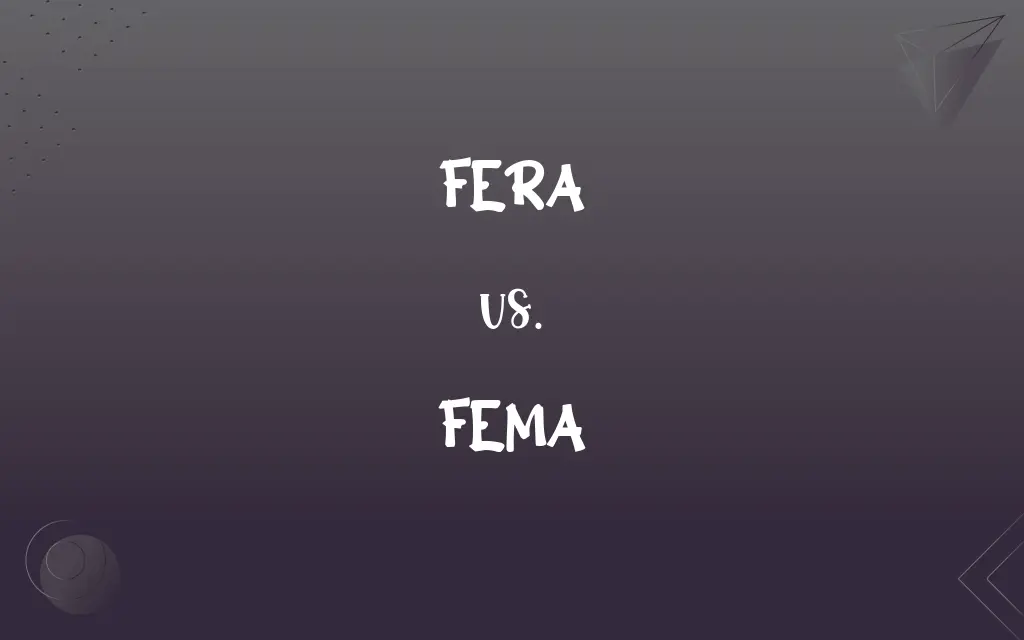FERA vs. FEMA: What's the Difference?
Edited by Aimie Carlson || By Harlon Moss || Published on February 25, 2024
FERA (Foreign Exchange Regulation Act) was a regulatory law for foreign exchange, replaced by FEMA (Foreign Exchange Management Act), which is more liberal and precise in managing forex.

Key Differences
FERA, the Foreign Exchange Regulation Act, was established in 1973 in India, primarily to regulate the inflow and outflow of foreign exchange and to conserve precious foreign reserve. Conversely, FEMA, the Foreign Exchange Management Act, introduced in 1999, replaced FERA. FEMA brought a significant shift from regulation to management and facilitation of foreign exchange.
FERA imposed stringent regulations and had a more controlling approach towards foreign exchange transactions. It was perceived as complex and harsh in terms of penalties. In contrast, FEMA emerged with a more user-friendly and liberal approach, emphasizing facilitating external trade and payments.
Under FERA, offenses were treated as criminal offenses, leading to severe penalties including imprisonment. FEMA, on the other hand, categorizes offenses as civil offenses and imposes monetary penalties, reflecting a more lenient and reform-oriented approach.
FERA applied to all citizens of India, foreign nationals in India, and Indian companies. However, FEMA is more specific, focusing primarily on transactions involving foreign exchange and external trade.
The introduction of FEMA marked a significant shift in the Indian government's stance towards foreign exchange, moving from stringent control to promoting a more relaxed and growth-oriented environment. FERA, with its restrictive framework, stood in contrast to this modern, liberal approach embraced by FEMA.
ADVERTISEMENT
Comparison Chart
Year of Enactment
1973
1999
Approach
Regulatory and restrictive
Liberal and facilitative
Offense Classification
Criminal offenses
Civil offenses
Penalty Severity
Harsh, including imprisonment
Monetary fines, more lenient
Primary Focus
Control and conservation of forex
Facilitation of external trade
ADVERTISEMENT
Applicability
Broader, including all citizens
Specific to foreign exchange dealings
FERA and FEMA Definitions
FERA
FERA, in economics, signifies a framework for managing foreign currency reserves.
FERA influenced the way Indian businesses engaged in international trade.
FEMA
FEMA, as a noun, denotes an act managing foreign exchange in India.
FEMA guidelines were easier to follow for multinational companies.
FERA
FERA, in administrative jargon, indicates a regulatory regime for foreign exchange.
The bank's foreign exchange department dealt extensively with FERA compliance.
FEMA
FEMA, in a legal context, stands for Foreign Exchange Management Act.
The new joint venture was established in accordance with FEMA regulations.
FERA
FERA, as a noun, refers to an act regulating foreign exchange.
The company had to ensure compliance with FERA regulations for its overseas transactions.
FEMA
FEMA, in financial terms, is a regulatory framework for external trade and payments.
FEMA played a key role in the growth of India's external trade.
FERA
FERA, as a legal term, is an acronym for Foreign Exchange Regulation Act.
The businessman was charged under FERA for unauthorized forex transactions.
FEMA
FEMA, in governance, implies a shift from control to facilitation in foreign exchange.
Under FEMA, the penalties for forex violations were reduced significantly.
FERA
FERA, in a historical context, refers to the Indian legislation controlling foreign currency.
FERA once played a crucial role in India's economic policies.
FEMA
FEMA, as an economic policy, represents liberalization in foreign exchange management.
Post-1999, FEMA facilitated greater foreign investment in India.
FEMA
An independent agency of the United States government that provides a single point of accountability for all federal emergency preparedness and mitigation and response activities
FAQs
When was FERA enacted?
FERA was enacted in 1973.
What year did FEMA replace FERA?
FEMA replaced FERA in 1999.
Why was FERA replaced by FEMA?
FERA was replaced by FEMA to liberalize and simplify foreign exchange regulations.
What does FEMA stand for?
FEMA stands for Foreign Exchange Management Act.
What is the primary objective of FEMA?
FEMA aims to facilitate external trade and payments.
What is FERA?
FERA, or Foreign Exchange Regulation Act, was a law to regulate foreign exchange in India.
Did FEMA make forex transactions easier?
Yes, FEMA simplified and liberalized forex transactions.
What changes did FEMA bring for foreign investors?
FEMA made it easier for foreign investors to enter the Indian market.
What was the main focus of FERA?
FERA primarily focused on regulating and conserving foreign exchange.
How does FEMA classify offenses?
FEMA classifies offenses as civil, with monetary penalties.
Did FERA have a broader applicability than FEMA?
Yes, FERA's applicability was broader than FEMA's.
Were FERA violations treated as criminal offenses?
Yes, FERA violations were considered criminal offenses.
Who was affected by FERA?
FERA affected all citizens, foreign nationals in India, and Indian companies.
How did FERA impact Indian businesses?
FERA imposed strict regulations, affecting how businesses managed foreign exchange.
What are the penalties under FEMA?
Penalties under FEMA are usually monetary fines.
Is understanding FEMA easier than FERA?
Generally, FEMA is considered more user-friendly and easier to understand than FERA.
How did FEMA affect international trade in India?
FEMA facilitated and boosted international trade in India.
Is FEMA more specific in its applicability?
Yes, FEMA specifically focuses on foreign exchange transactions.
Can FEMA violations lead to imprisonment?
No, FEMA violations typically result in monetary fines, not imprisonment.
Was FERA more stringent than FEMA?
Yes, FERA was more stringent compared to the liberal FEMA.
About Author
Written by
Harlon MossHarlon is a seasoned quality moderator and accomplished content writer for Difference Wiki. An alumnus of the prestigious University of California, he earned his degree in Computer Science. Leveraging his academic background, Harlon brings a meticulous and informed perspective to his work, ensuring content accuracy and excellence.
Edited by
Aimie CarlsonAimie Carlson, holding a master's degree in English literature, is a fervent English language enthusiast. She lends her writing talents to Difference Wiki, a prominent website that specializes in comparisons, offering readers insightful analyses that both captivate and inform.































































